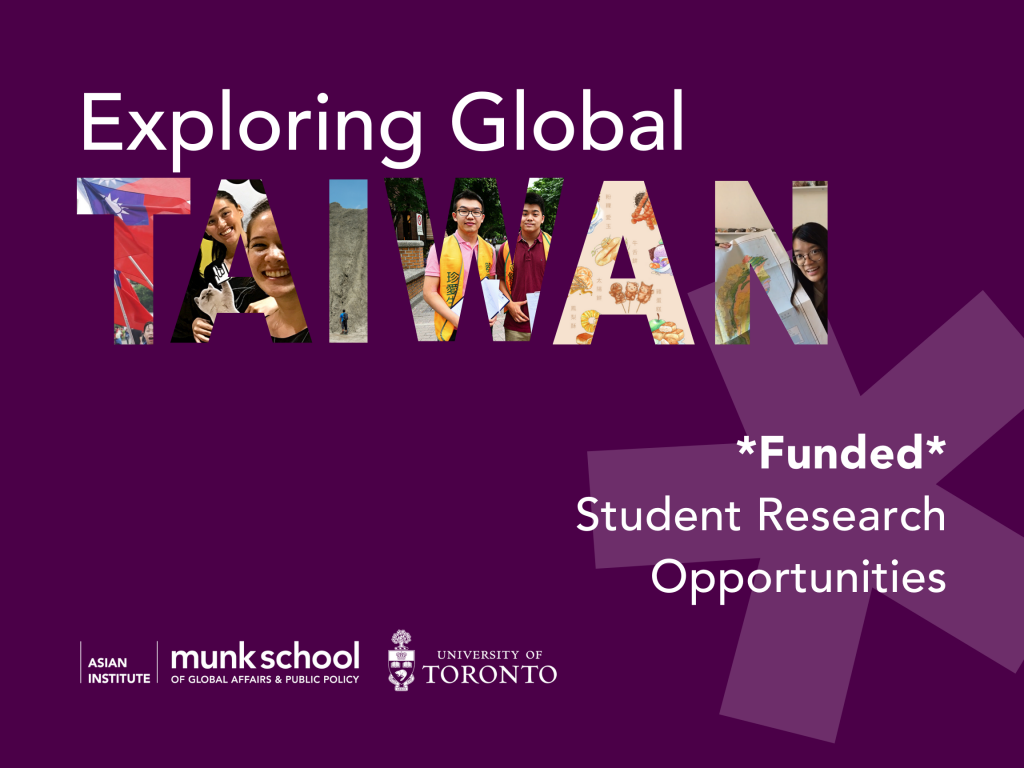
Big Ideas Competition: Exploring Global Taiwan
*2022 call for Student applications*
deadline: February 18, 2022
2022 big Ideas competition: exploring global taiwan
The Global Taiwan Studies Initiative’s Big Ideas Competition: Exploring Global Taiwan supports outstanding student experiential research connected to Taiwan.
This year, we are thrilled to launch a new version of our Exploring Global Taiwan program, which invites students to work on a research project led by an Asian Institute faculty member.
Working together in small, focused teams, awarded students will be FUNDED to conduct research on a professor-led project over the summer semester, gaining direct research experience on a major scholarly project with an expert in the field. *The list of faculty projects follows below
In addition to a unique research experience, awardees form a dynamic peer group. Students will receive academic and professional development training specific to their faculty-led project. They will also be supported in developing all the tools necessary for a successful Exploring Global Taiwan experience—from submitting an initial application to presenting research outcomes and beyond.
Exploring Global Taiwan will culminate with a public showcase of research outcomes in September 2022.
- The program is open to undergraduate and graduate students across all three University of Toronto campuses. Students currently enrolled at the Asian Institute will be prioritized.
- The program will allow for in-person (if the public health situation allows) and remote activities
- Awarded students will receive approximately $1,000-$2,000 CAD
- Expected time commitment will be no more than 50 hours
2022 Timeline
| Call for Applications Posted | Late January, 2022 |
| Info Session & Statement of Interest Workshop – Register here! | 12-1 PM, February 10, 2022 |
| Applications Due | February 18, 2022 |
| Awardees Announced | March 11, 2022 |
| Meet & Greet | March, 2022 |
| Research Methods and Ethics Workshop | April, 2022 |
| Research Period | April-August, 2022 |
| Monthly Cohort Meetings | May-August, 2022 |
| Written Report Deadline | Late August, 2022 |
| Public Presentation | September, 2022 |
how to apply
Please complete this online application form and email your CV/resume as a single PDF to Shannon Garden-Smith ai.coordinator@utoronto.ca by 11:59PM EST, February 18, 2022. When emailing your CV/resume please use the email subject line ” Your Name – Global Taiwan Application 2022″ and name your file “Last Name_First Name-Global Taiwan Application 2022”
Because Microsoft Forms does not allow you to save your progress, we’ve created this downloadable PDF listing the application questions. This will help you to draft your application before submitting. Questions 1-8 ask for basic information and questions 9-14 ask for your key statements of interest.
questions?
Please don’t hesitate to reach out to
Shannon Garden-Smith
Research Coordinator, Asian Institute
Munk School of Global Affairs & Public Policy
Rm. 103N-North House, 1 Devonshire Place
Toronto, ON M5S 3K7
Email: ai.coordinator@utoronto.ca
BONUS! Drop by our online information session and workshop about submitting your application on Thursday, February 12, 12-1pm. Register here for the zoom link!
2022 FACULTY PROJECTS
Professions and Politics in Taiwan and Hong Kong
Associate Professor, Department of Sociology, UTM
Acting Director, Global Taiwan Studies Program
Project Description
This research project examines the political participation of professional groups, such as doctors, lawyers, and journalists, in Taiwan and Hong Kong. The research tasks include the collection and analysis of archival and web-based data on the professional backgrounds and career trajectories of politicians and government officials in both societies. The research assistants are expected to have basic training in social science methods and high reading proficiency in both English and Chinese (traditional & simplified). Cultural familiarity with Taiwan and/or Hong Kong is preferred. Both graduate and undergraduate students are welcome to apply.
Project period: May 2022 (4 weeks)
Work mode: hybrid – a mix of in-person (if the public health situation allows) and virtual meetings
Professor Sida Liu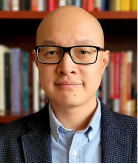 ’s Biography
’s Biography
Professor Sida Liu received his LL.B. degree from Peking University Law School and his Ph.D. in sociology from the University of Chicago. He joined the Department of Sociology at the University of Toronto in 2016 after teaching sociology and law at the University of Wisconsin-Madison. He also holds a cross-appointment at the Faculty of Law.
Professor Liu’s research interests include the sociology of law, organizations and professions, social theory, criminal justice, and globalization. He has conducted extensive empirical research on China’s legal reform and legal profession, including the globalization of corporate law firms, the political mobilization of criminal defense lawyers, the feminization of judges, and the career mobility of law practitioners. His current project examines the influence of colonialism and authoritarianism on the professions in Hong Kong and Taiwan. In addition to his empirical work, Professor Liu also writes on theories of law, professions, and social spaces following the tradition of Georg Simmel and the Chicago School of sociology.
Professor Liu is the author of three books in Chinese and English, most recently, Criminal Defense in China: The Politics of Lawyers at Work (with Terence C. Halliday, Cambridge University Press, 2016). He has also published many articles in leading law and social science journals, including the American Journal of Sociology, Canadian Review of Sociology, Sociological Theory, Law & Society Review, Law & Social Inquiry, China Quarterly, etc. Professor Liu is a Faculty Fellow at the American Bar Foundation, as well as an affiliated scholar of the U.S.-Asia Law Institute at New York University School of Law and the Center on the Legal Profession at Harvard Law School. In 2016-2017, he was a Member of the Institute for Advanced Study in Princeton.
The “Salvation of Women in China” as an Anti-Communist Agenda
Professor, Department of Sociology, UTSC
Project description:
This project proposes to examine how the National Women’s League of the Republic of China (中華民國婦女聯合會) rallied women in Taiwan in support of the Kuomintang’s anti-Chinese communist agenda in the 1950s and 60s. It analyzes the ways in which the notion of “salvation of women in China” (解救大陸婦女同胞) was constructed and presented in Women’s Friend (婦友), the official publication of the League.
Students will review, categorize, and conduct preliminary analyses of articles published in Women’s Friend (婦友) pertinent to the subjective issues. Through such tasks, student RAs will learn how to organize and analyze archival documents. Student RAs must be able, or willing to learn, to read non-simplified Chinese. Prior research experience working with original data will be a plus.
Professor Ping-Chun Hsiung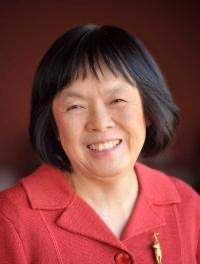 ’s Biography
’s Biography
Professor Ping-Chun Hsiung teaches undergraduate and graduate courses on family, gender relations, and qualitative research methods. Her research focuses on two areas: (1) social changes and gender relations in Chinese societies; (2) critical qualitative research. Over the last two decades, she has contributed to the development of women’s NGOs in China and the establishment of women’s studies program in Chinese higher education. She continues to engage in dialogue and scholarly collaboration with scholars in Taiwan and China on qualitative research. She is currently conducting research on the history and development of qualitative research in China, with a specific emphasis on the relationship between the state, intellectuals, and sociology discipline. Professor Hsiung is also affiliated with the faculty of East Asian Studies and the Asian Institute at the Munk School of Global Affairs.
2020 Big Ideas Competition: Exploring Global Taiwan Recipients
- THE ROLE OF INDONESIAN DOMESTIC CARE WORKERS IN TAIWANESE SOCIETY
- TEMPTING FORMOSA: A TAIWANESE DESSERT COOKBOOK
- ON THE TRANSNATIONAL MIGRATION OF VIETNAMESE WOMEN: CREATING A SENSE OF PLACE WITHIN TAIWAN’S URBAN AND DOMESTIC ENVIRONMENT
- MARRIAGE ANXIETY: CITIZEN PRODUCTION, EXCLUSION AND TAIWAN’S LGBTQ
The role of Indonesian domestic care workers in Taiwanese society
- Kana Minju Bak (Contemporary Asian Studies)
- Pranav Dayanand (Contemporary Asian Studies)
- Angelah Liu (Contemporary Asian Studies)
- Jielun Zheng (Contemporary Asian Studies)
Our project is an in-depth view into the mechanisms that characterize the experiences of Indonesian migrant workers in Taiwan. Our study delves into the literature on Indonesian domestic care workers in Taiwan and the historic context that informs their experiences today. We supplement these materials with surveys on wider Taiwanese public opinion on Indonesian migrant workers as well as an in-depth look at the presence of Indonesian TikTok users, which provides insight into aspects of their daily lives.
Tempting Formosa: A Taiwanese Dessert Cookbook
- Stephanie Tai (City Studies, International Development, and Anthropology)
Tempting Formosa: A Taiwanese Cookbook provides insights into traditional desserts offered in Taiwan by presenting recipes that tell the story of this nation rich with culinary history. The cookbook focuses on Taiwanese desserts that are not well-known internationally, as told through stories of colonial influences, modern innovation, and the evolution of the contemporary Taiwanese palette.
Tempting Formosa is not only a history lesson on Taiwan, it also serves as a medium for hands-on interaction, connecting the cuisine with a global audience looking to broaden their culinary horizons as food continues to play a role in improving awareness of global cultures and heritage and preserving them. The cookbook takes you on a journey of the island’s beloved desserts, widening what we know as Taiwanese food and offering an anthropological look into what makes a country’s cuisine distinguishable. So, enjoy the whiffs of butter and sugar that magically materialize out of the air as you flip through the pages, and let Tempting Formosa act as your guide on this Taiwanese culinary exploration.
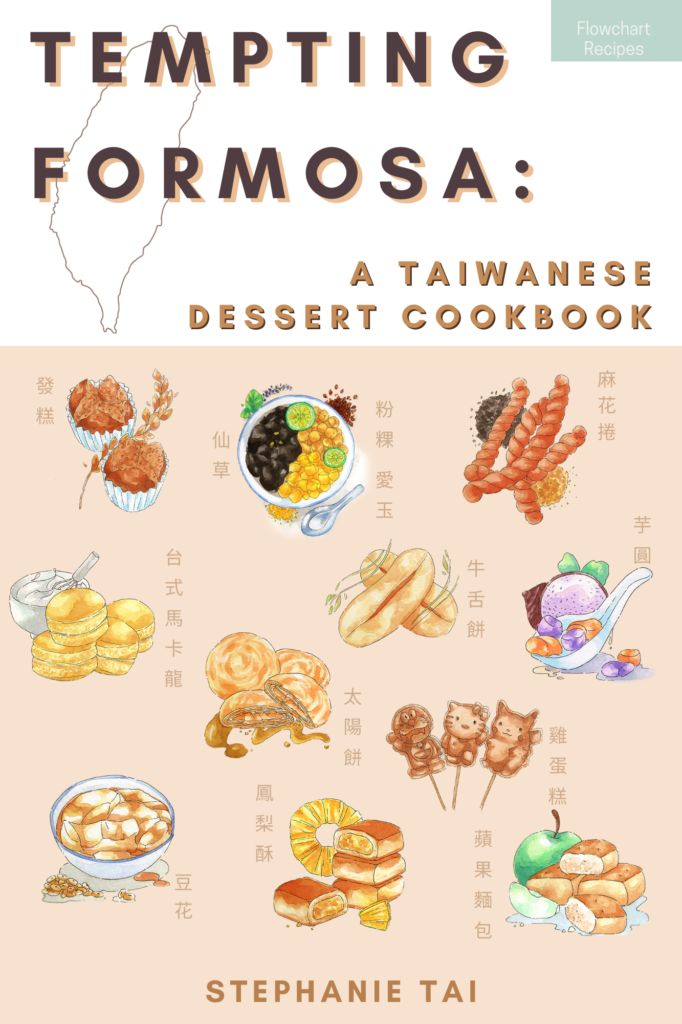
On the Transnational Migration of Vietnamese Women: Creating a Sense of Place within Taiwan’s Urban and Domestic Environment
- Miranda Fay (Masters of Architecture Candidate, John H. Daniels Faculty of Architecture, Landscape and Design)
- Phat Le (Masters of Architecture Candidate, John H. Daniels Faculty of Architecture, Landscape and Design)
- Sidney Tsao (Masters of Architecture Candidate, John H. Daniels Faculty of Architecture, Landscape and Design)
Throughout the island’s history, Taiwan’s national identity has been a topic of contestation. This research aims to document Taiwan’s shifting demographics in the modern era; specifically, the influx of Vietnamese migrants into Taiwan who are predominantly female. These women often adopt roles as care-takers, foreign brides, or small business owners in search of economic growth and stability. Sociologists recognize this phenomenon as the ‘feminization of migration’ (Hugo, 2005) which describes the challenges that migrant women face in attempts to assimilate. These challenges include navigating conflicting cultural norms, lack of social capital, and exploitative marriage arrangements. Building on research discussing the politics of space (Lefebvre, 1974) and the contributions of the built environment to a sense of place (Stedman, 2003), this research asks: in what ways have Vietnamese women created identity and agency for themselves through physical interventions in space within Taiwan’s urban and domestic landscape? Using online documentation (such as articles, websites, and social media posts) and a series of architectural and urban drawings as methods of analysis, this research records and maps evidence of these Vietnamese spaces (homes and restaurants) and how they are used to establish autonomy and cultural representation for the Vietnamese community.
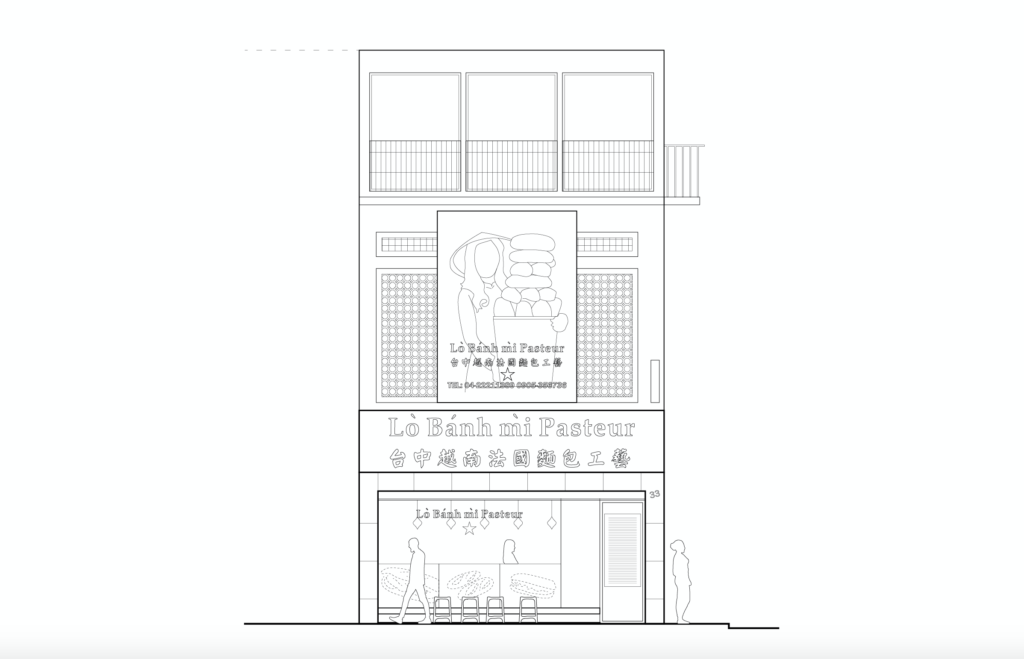
Marriage Anxiety: Citizen Production, Exclusion and Taiwan’s LGBTQ
- Thomas Elias Siddall (International Relations and Contemporary Asian Studies)
This project explores how the Taiwanese state has anxiously secured a dynamic sociopolitical regime with its citizens that has enabled same-sex marriage by learning from the biopolitics around cross-border marriage. Under a global “progressive” neoliberal rights regime, cross-border migrants in Taiwan are actively marginalized while the LGBTQ in Taiwan become a hallmark of progress; both bodies reproduce essentialized values in Taiwan. I make use of family-state discourse analysis, work with imitation and queer Marxist theory, and read tongzhi wenxue and the Act Governing the Choice of Law in Civil Matters Involving Foreign Elements (2010) as ideology and society as text to consider the construction of Taiwanese subjectivities and the necessity to construct bodies in specific ways. This work contributes to the immense literature on cross-border marriage and of the Taiwanese developmental state to explore how biopolitics disciplines sexuality as a resource in global contexts to signify Taiwan’s belonging in a community of Western nations. By making use of Butler’s use of imitation my work demonstrates how the LGBTQ imitation of a heteronormative subject position simultaneously constructs the limits of Taiwanese citizenship. In sum, this work finds that there is a dynamic relationship between the state and its subjects and that the state makes its subjects knowable based on access to services. This piece finds that the LGBTQ community in Taiwan follows a developmental model of construction and is a step away from queer activism in Taiwan before democratization. Finally, this work finds that law works as an intermediary for biopolitics.
2019 Big Ideas Competition: Exploring Global Taiwan Recipients
- THE REFERENDUM
- THE EVERYDAY POLITICS OF LGBTQ MINORITIES IN TAIWAN: DISCRIMINATION, LEGALIZATION, AND COMMUNITY
- EXHIBITING IN-JUSTICES: HUMAN RIGHTS DISCOURSES IN TAIWAN’S RECENT REDRESS EFFORTS
- HSIEH-PIAO AND THE POLITICS OF PERSONALIZATION IN TAIWAN
- ANTI-DEATH PENALTY EFFORTS IN TAIWAN
The Referendum
- Adam Zivokinovic (“Zivo”) (Munk School of Global Affairs & Public Policy)
- Ji Chen (Tony) Yin (Munk School of Global Affairs & Public Policy)
The Referendum is a documentary about Taiwan’s 2018 referendum on marriage equality. Triggered by a constitutional court ruling that ordered the government to amend its marriage laws, the referendum saw voters reject marriage equality. This documentary explores how the referendum happened, who was involved, and what they believed. The documentary contextualizes the issue within a larger conversation on the global acceptance of LGBTQ+ rights. It consists of interviews cut with archival footage, news clips, TV clips, and b-roll footage shot in Taipei, and takes a sensitive and nuanced view of both sides of the debate.
Through our research, we found that the anti marriage equality groups have a much more nuanced approach to LGBTQ+ issues than we previously imagined. While their beliefs can be partially attributed to hostility to LGBTQ+ folks, their stance is complicated by underlying disagreements on the nature of government. We also observed that the spread of information through mass media and social media played a pivotal role in swaying the result of the referendum. Furthermore, we found that Taiwanese religious organizations played a vital role in the referendum, essentially forming the backbone of anti-LGBTQ+ groups.
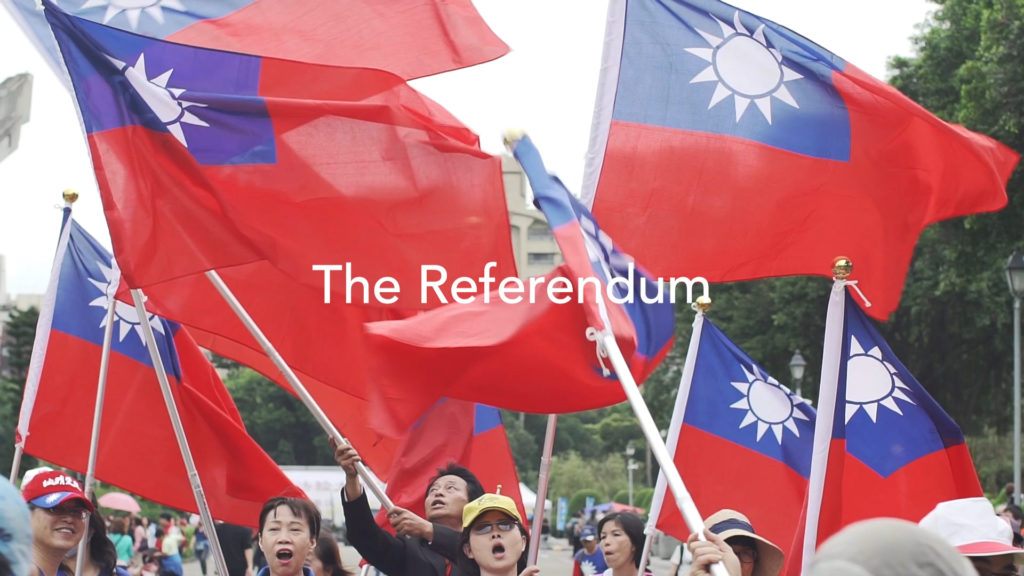
The Everyday Politics of LGBTQ Minorities in Taiwan: Discrimination, Legalization, and Community
- Anson Au (Department of Sociology; Department of Chinese Literature, Joint Appointment, National Sun Yat-Sen University)
On May 17, 2019, Taiwan legalized same-sex marriage, the first society to do so in all of Asia. Despite pundits’ celebration of the decision as a sign of liberal progression, the legalization appears at odds with the results of recent major referendums that show a majority of the Taiwanese population opposes pro-LGBTQ+ values, following a steady pattern of declining tolerance for LGBTQ+ minorities in Taiwan. To make sense of this conundrum, this article conducts a qualitative study of LGBTQ+ minorities and activists to interrogate experiences of discrimination in LGBTQ+ minorities’ everyday lives. I analyze the latent forms of discrimination in the tensions and politics of navigating between expression and censorship in the family and the workplace, how legalization exacerbates rather than alleviates these forms of discrimination, and how pro-LGBTQ+ organizations protect LGBTQ+ minorities and accordingly develop recommendations for public policy. This genre of everyday politics across the family and workplace alike bears emphasis in order to foreground patterns of political participation and of mental health problems that continue to disproportionately affect LGBTQ+ minorities.
Exhibiting In-Justices: Human Rights Discourses in Taiwan’s Recent Redress Efforts
-
Sabrina Teng-io Chung (PhD student, Department of East Asian Studies)
In December 2017, Taiwan’s Legislative Yuan passed the Act on Promoting Transitional Justice and the Organizational Act of the National Human Rights Museum, both of which serve as landmark legislation, enabling state-directed efforts to redress historical wrongs and injustice perpetuated during the nation’s authoritarian era—a period juridically defined as spanning from 15 August 1945 when the Japanese empire collapsed, to 6 November 1992, the lifting of the Martial Law on Taiwan’s offshore islands. Despite concerns regarding this new wave of redress efforts’ unwillingness to tackle past and ongoing forms of injustice related to the legacies of Japanese imperialism and Han settler colonialism in Taiwan, the establishment of the Transitional Justice Committee and National Human Rights Museum in 2018 (a year that also marked the 70th Anniversary of the Universal Declaration of Human Rights), institutionally effectuated a proliferation of teleological accounts celebrating Taiwan’s transition from a divided, conflictual nation to a post-violent one.
This project takes Taiwan’s recent redress efforts not so much as the ideological and institutional markers of democratic progress but entry points from which a genealogical inquiry can be made about how ideas of justice, the human and its rights are contested, codified, and negotiated. It offers a close examination of past and current exhibition practices related to Taiwan’s 228 Incident and the following White Terror, practices whose epistemological and affective frames of reference are arguably closely intertwined with the Cold War and post-Cold War historical and institutional conditions of knowledge production. By attending to the ways in which the Taiwanese state’s multiple efforts to redress historical injustices have been enabled yet contained within such structures of power/knowledge, this project seeks to call forward a reconceptualization of ideas of justice as that which is yet-to- come, irreducible to the teleological and therapeutic terms of human rights discourses.
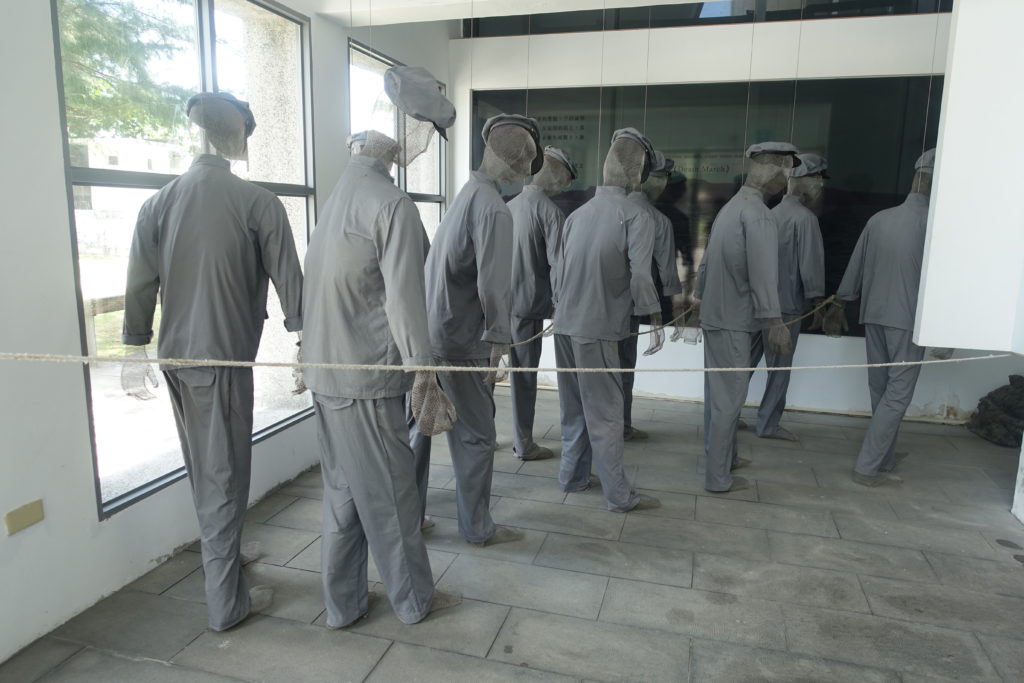
Hsieh-Piao and the Politics of Personalization in Taiwan
- Yiwei Jin (MA student, Department of Political Science)
In Taiwan, most candidates for public office go on a tour to personally thank voters after elections conclude. This tour is called hsieh-piao (謝票), a practice that has existed in Taiwan for almost 70 years. My research project tries to understand why the practice continues to thrive in Taiwan. Based on archival and survey-generated data, I argue that hsieh-piao in Taiwan today is a product of personalized voter-politician relationships—relationships built over repeated personal interactions. In these relationships, a positive impression of the candidate is established over a long period of time across many interactions, and hsieh-piao plays a major role in this process. However, not all voters relate to politicians in such a way. In fact, I found that the majority of voters do not think much of hsieh-piao. Politicians, while aware of the fact that most voters do not care about hsieh-piao, nevertheless perform it. Some are worried about losing support from voters for whom hsieh-piao is important, and some also see hsieh-piao as intrinsically meaningful.
Read Jin Yiwei’s article “The Art of Thanking in Taiwan’s Elections” in the Taiwan Gazette here.
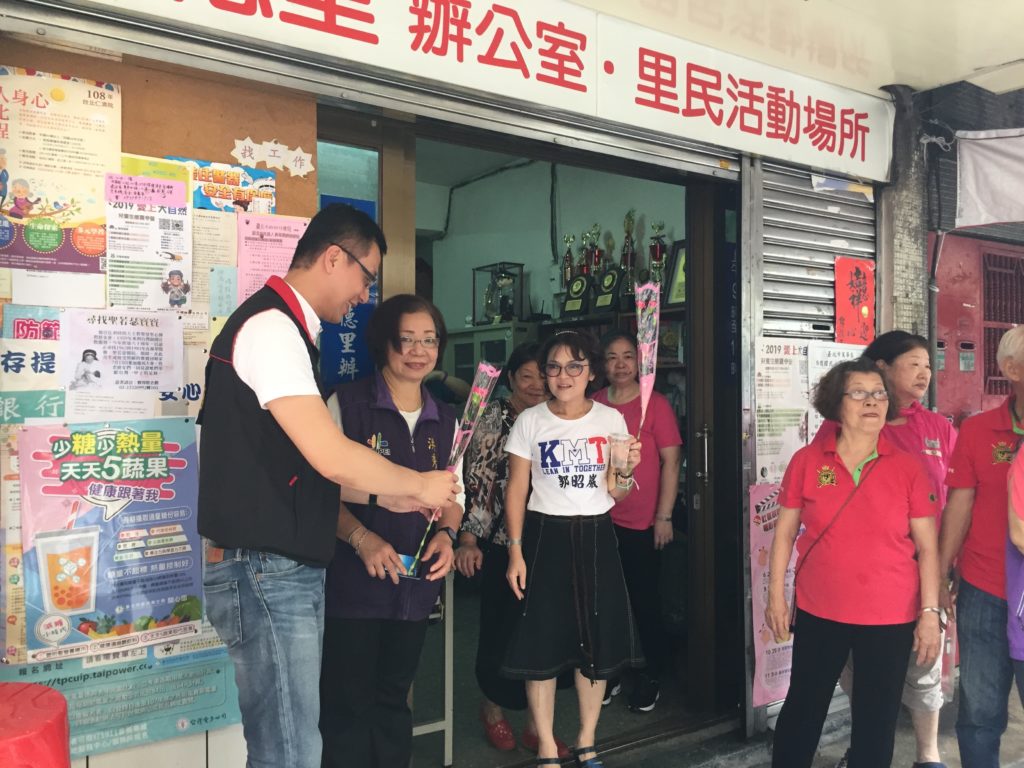
Anti-Death Penalty Efforts in Taiwan
- Niki C Yang (Criminology)
- Celina B. Servanez (Criminology and Sociolegal Studies, graduate department)
- Sohrab Naderi (Political Science and Criminology)
Our team sought to research why Taiwan has retained the death penalty despite being a developed country with modern liberal democratic norms. To this end, we conducted interviews with individuals familiar with anti-death penalty efforts in Taiwan—mainly volunteers and executive members of two major reform organizations, the Taiwan Alliance to End the Death Penalty (TAEDP) and the Judicial Reform Foundation (JRF). Our research reveals that Taiwan’s retention of the death penalty is related to systematic issues suffusing Taiwan’s criminal justice system as a whole. We found that support for capital punishment is part of a feedback loop wherein societal, affective reactions to high-profile cases influence court decisions and vice versa. Such support is largely passive and normative not for any cultural-specific reason, but due to widespread belief in the idea of retribution as “justice.” We conclude that NGOs like TAEDP and JRF are inherently radical by the very fact that they recognize and give voice to a sector of society whose silence and disposability is otherwise the norm.
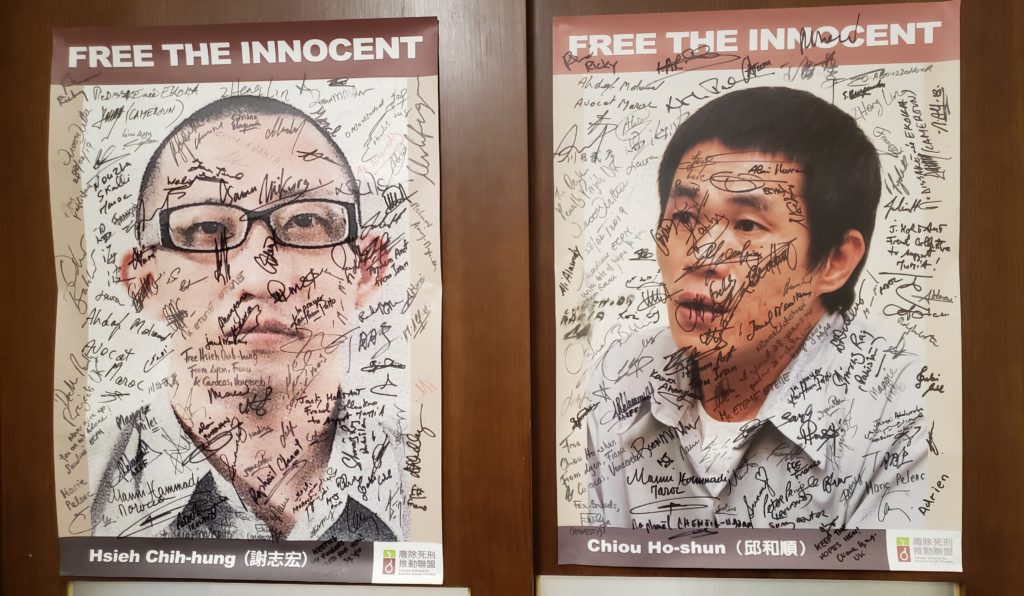
2018 Big Ideas Competition: Exploring Global Taiwan Recipients
- OP ASIAN GAMER: WORK AND PLAY IN TAIPEI’S ESPORTS INDUSTRY
- INDIGENOUS HISTORY IN TAIWAN’S NATIONAL MUSEUMS
- TAIWAN IN TRANSITION: TOWARDS SUSTAINABLE INNOVATION
- DESIRE FOR GENDER AND SEXUAL EGALITARIANISM AT WORK: TAIWANESE LESBIAN WORKPLACE DISCRIMINATION
- ROADSIDE GEOLOGY OF TAIWAN
- TAIWAN, DUNHUANG AND THE NEW YORK WORLD’S FAIR 1964-1965: THE AFTERLIFE OF JAMES AND LUCY LO’S ARCHIVE
- THE EXPERIENCE OF LATIN AMERICAN AND CARIBBEAN HIGHER EDUCATION STUDENTS IN TAIWAN
- KNOWLEDGE ATTITUDES AND BELIEFS ON ORGAN DONATION AND TRANSPLANTATION IN TAIWANESE CITIES
- DECENTRALIZED IDENTITIES AND CULTURAL PRODUCTION IN TAIWAN
- AGRICULTURE 4.0 IN TAIWAN: THE DISCONNECT BETWEEN FARMERS AND SERVICE PROVIDERS
OP ASIAN GAMER: WORK AND PLAY IN TAIPEI’S ESPORTS INDUSTRY
- Jordan Ali (Department of Geography and Planning)
- Fay Lin (Department of English; Diaspora and Transnational Studies)
Taipei inhabits a transnational site of productive friction as a result of decisive investment from the Californian game industry-giant, Blizzard, alongside condemnations of video games in both national and international media. “Gaming” itself has been at the center of debate surrounding anxieties of time-wasting, productivity, and male youth arriving into increasingly competitive labour markets. On the one hand, gaming seems a useless form of virtual leisure, while on the other it rewards skilled players with lucrative professional contracts. This raises questions about the centrality of Taiwan and Taiwanese gamers in the future of the global eSports industry.
For our research project, we explore the tensions surrounding gaming and eSports by applying a spatial analysis of sites across Taipei that, though seemingly different in function, allow us to reconsider the taken-for-granted spaces through which an eSports landscape forms: Taipei’s internet cafes, electronics retail centres, and the Blizzard eSports Arena. Initially these three gamespaces seem connected exclusively to the realm of play. However, in visiting and observing the social exchanges in these spaces, and the spaces themselves, we discovered that gaming presents the unique ability to collapse work and play into an ambiguous set of practices that can commodify, commercialize, or reimagine gamespaces as capable of both productivity and leisure, troubling discourses that designate mutually exclusive spaces for binaries of ‘work’ and ‘play.’
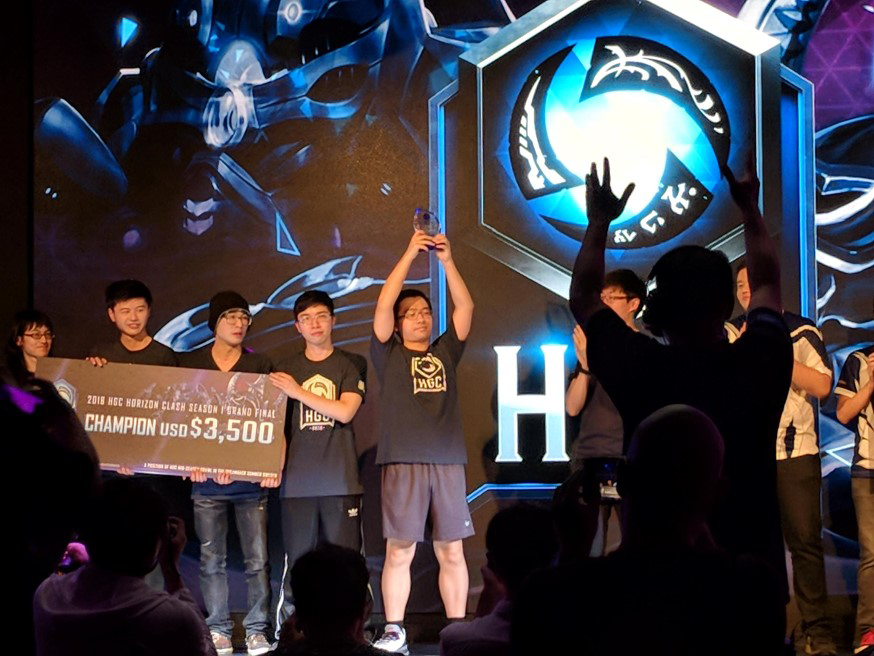
Blizzard eSports Arena–the winning team hoists the championship trophy after defeating their regional nemesis. Photo: Ali Jordan.
INDIGENOUS HISTORY IN TAIWAN’S NATIONAL MUSEUMS
- Natalie Bell (MA in East Asian Studies/Collaborative MA in Contemporary East and Southeast Asian Studies)
Through interviews and field research at museums in Taiwan I examined the role indigenous history plays in what Benedict Anderson refers to as “national biography” and how that role is changing. As recognition of an indigenous past in Taiwan carries the connotation of an alternative to the previously China-focused Guomindang (KMT) supported national narrative, the increasing representation of indigenous histories in national museums reflects a political recognition of non-Chinese ancestry. Museums in Taiwan appear to be moving away from decontextualized presentations of indigenous groups as a remote past, unchanging and separated from wider Taiwanese history, to a presentation of Taiwan itself as diverse, incorporating indigenous histories into presentations of immigrant history, and giving indigenous groups an active voice in historical events. Museums are also increasingly collaborating with indigenous groups to develop exhibitions. At first glance, new exhibits and academic support for these changes seem to draw an important connection between diversity and democracy, reflecting transformations in Taiwanese politics since 1971. This change may not reflect Taiwanese political changes solely but is also the result of academic pressures on worldwide trends in museum presentations of indigenous peoples.
TAIWAN IN TRANSITION: TOWARDS SUSTAINABLE INNOVATION
- Siobhan Bradley (Munk School of Global Affairs, MGA)
- Ayesha Bery (Munk School of Global Affairs, MGA)
- Pemasal Banigan (Munk School of Global Affairs, MGA)
In an effort to maintain global competitiveness, Taiwan has begun to transition to a knowledge-based economy. In tandem with this transition, the Taiwanese government has launched an ambitious plan to become the Silicon Valley of Asia, focused on fostering innovation, an entrepreneurship ecosystem, an improved education system, and various national policy initiatives. However, Taiwan’s human capital issues–specifically its talent deficit and brain drain–pose questions regarding Taiwan’s ability to maintain its status as an innovation powerhouse. Our research project investigates Taiwan’s talent deficit and the sustainability of Taiwan’s innovation plan. Following qualitative research with industry leaders, government officials, innovation hubs, and entrepreneurs, our research team gained diverse perspectives on the Asia Silicon Valley Development Plan (ASVDP) and Taiwan’s innovation landscape more broadly. The main conclusion we drew from interviews and research is that while the ASVDP is an ambitious plan seeking to transition Taiwan’s innovation economy from hardware manufacturing to the Internet of Things (IoT) while bolstering the start-up landscape in Taiwan, the direct effects of the plan are misguided and unclear. Based on desk and field research, we concluded Taiwan should focus on a niche innovation area, deregulation, and supporting entrepreneurs. We consolidated our research into an editorial piece that will be shared with the Asia Silicon Valley Development Agency (ASVDA), interview partners, and the Asian Institute at the Munk School of Global Affairs and Public Policy.
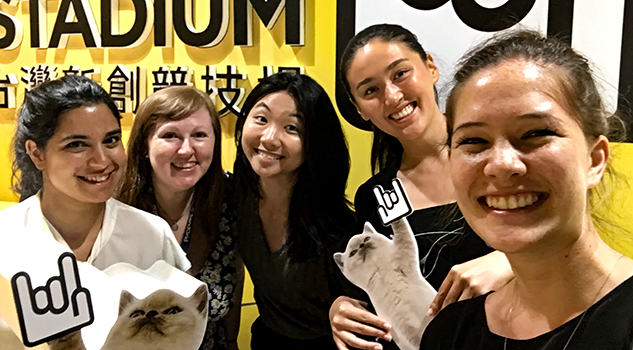
Pemasal Banigan, Ayesha Bery, and Siobhan Bradley meeting with Taiwan Startup Stadium.
Siobhan Bradley, Ayesha Bery and Pemasal Banigan published their research as an article in the Taiwan Gazette. Read the article here.
DESIRE FOR GENDER AND SEXUAL EGALITARIANISM AT WORK: TAIWANESE LESBIAN WORKPLACE DISCRIMINATION
- Hai-Wen Chen (Arts and Science)
- Michelle Lee (Arts and Science)
LGBTQ communities in Taiwan continue to experience upward mobility, with recent legislative changes in same-sex marriage representing the most significant positive breakthrough for LGBTQ representation in mainstream society. Yet research shows that predominant Confucian-Patriarchal ideologies continue to make LGBTQ integration challenging. Among these issues, workplace discrimination is understudied in existing literature. Using our academic expertise and LGBTQ networks within Taiwan, we researched workplace discrimination experienced by lesbian Taiwanese women and whether recent legislative changes have had any discursive social impact in professional work environments. Overall, it seems that current legislation regulating workplace conduct focuses mostly on addressing gender-based discrimination rather than that of sexual-orientation, and regardless of legislation it seems the enforcement of such workplace protections is still lacking in many aspects. In addition, workplace discrimination is experienced differently depending on gender performativity, especially how effeminate women present themselves in the work environment. In response to this, individual women often attempt to be selective about the workplace environments they apply to, rather than addressing the issue directly through legal action or explicit confrontation with their employers. Our paper explores the ideological and legal issues motivating such outcomes.
ROADSIDE GEOLOGY OF TAIWAN
- Stephanie Chen (Department of Earth Sciences)
This project is a close-up field survey of the geology of various regions of Taiwan. I visited select areas of Taiwan and collected rock samples to further analyze in Toronto. I compared these findings to current literature, most of which is decades old. I seek for this project to expose discrepancies between new and old research and to encourage more research in certain areas lacking in the literature. I assembled my findings in a guide book to the geology of Taiwan, titled “Roadside Geology of Taiwan: A Field Guide.”
Access Stephanie Chen’s “Roadside Geology of Taiwan: A Field Guide” here.
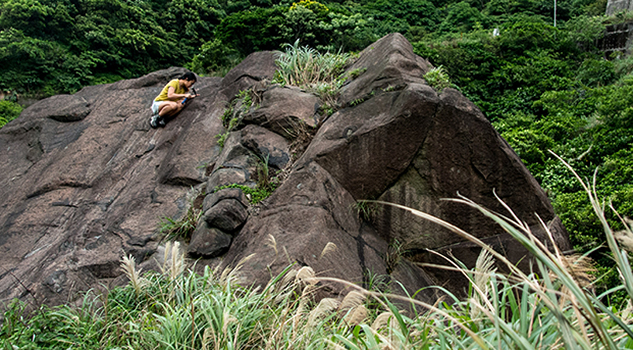
Stephanie Chen conducting geological fieldwork in Taiwan.
TAIWAN, DUNHUANG AND THE NEW YORK WORLD’S FAIR 1964-1965: THE AFTERLIFE OF JAMES AND LUCY LO’S ARCHIVE
- Shasha Liu (East Asian Studies)
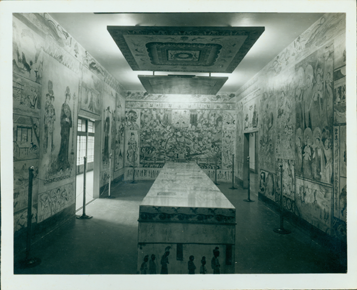
Documentation of the display of the Dunhuang mural copies at the National Museum of History 1955-56 provided by Chia-ling Chen.
Focusing on the Dunhuang mural copying activities based on the James and Lucy Lo’s archive in Taiwan in the 1950s and the display of the Dunhuang copies in the New York World’s Fair 1964-65, I conducted research in Taipei in institutions like the National Museum of History, Academia Sinica (Taipei and Xindian), and National Central Library. I collected valuable primary materials from the Taiwanese Dunhuang copying activity also learning that it is part of a larger project to reconstruct cultural heritage in Taiwan in the aforementioned museum. By studying the archive of the fair, I was also able to piece together the participation process of the Dunhuang mural copies and to better understand the negotiations between Taiwan and the US in terms of selecting Chinese art treasures. The textual materials I collected at the library further helped me to get a more complete picture of the perception of the Dunhuang art in Taiwan around the mid-20th century, compensating for the lack of information in the above archives. The archival research I conducted in Taiwan assists me in analyzing how the Dunhuang mural copies based on the Lo’s archive contribute to the reconstruction of cultural heritage in Taiwan and the Taiwanese endeavors to connect to the world with the imagined Dunhuang tradition.
THE EXPERIENCE OF LATIN AMERICAN AND CARIBBEAN HIGHER EDUCATION STUDENTS IN TAIWAN
- Adriana Marroquin Rodriguez (MEd Higher Education, Comparative, International and Development Education, Ontario Institute for Studies in Education)
This study explores the experiences of Latin American and Caribbean (LAC) higher education students in Taiwan: what motivates them to go to Taiwan, the challenges they face, and how they cope with these issues. I collected data via semi-structured interviews of eleven students pursuing bachelor’s degrees. I identified the following three major challenges: language, academic, and sociocultural issues and identified an open mind, support groups, and resourcefulness as the main coping strategies. I used the findings and participant suggestions to create a list of recommendations for new and current students. The results also highlight future research that should be performed as well as implications for funding organizations, universities, professors and local students to better support international students.
KNOWLEDGE ATTITUDES AND BELIEFS ON ORGAN DONATION AND TRANSPLANTATION IN TAIWANESE CITIES
- Jonathan Wang (BSc Candidate, Faculty of Arts and Science; Research Trainee, Multi-Organ Transplant, Toronto General Hospital)
- Derrick Lin (BSc Candidate, Faculty of Arts and Science; Research Trainee, Multi-Organ Transplant, Toronto General Hospital)
Through our research we aim to understand the knowledge, attitudes, and beliefs that may prevent people in Taiwanese cities from donating organs for transplantation and promote organ donation awareness in Taiwan. We held discussions with family members of deceased donors and hosted a discussion forum with representatives from Taiwan Organ Registry and Sharing Center (TORSC) to promote organ donation awareness. We used a survey tool to investigate attitudes and beliefs on organ donation and transplantation (ODT). We surveyed adults by random sampling at public venues and by chain-referral sampling from an agribusiness company.
The discussion forum with TORSC sparked a sustained collaboration with the investigators. Approximately half (50.5%) of people surveyed knew how to register to become organ donors, but only 13.3% had registered. Those who had misconceptions about the organ donation process were less likely to support organ donation. These respondents were misinformed about the laws and general concepts of ODT including believing that donors receive worse medical care and the rich are preferentially transplanted. Further research can address these issues with novel hypotheses and evaluate government initiatives to educate the Taiwanese public.
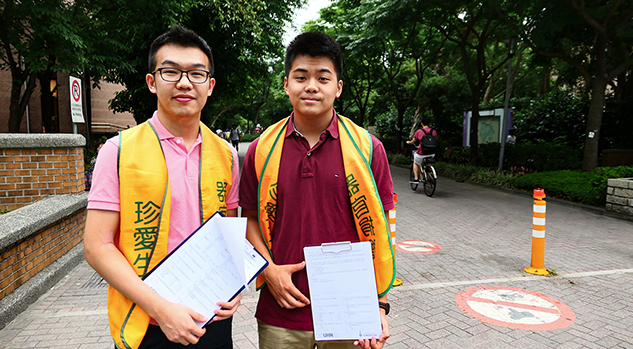
Jonathan Wang (left) and Derrick Lin (right) pilot their survey tool at National Taiwan University.
Jonathan Wang and Derrick Lin published their research as an article in the Taiwan Gazette. Read the article here.
DECENTRALIZED IDENTITIES AND CULTURAL PRODUCTION IN TAIWAN
- Aaron Wytze Wilson (MGA Candidate, Munk School of Global Affairs and Public Policy)
“Taiwanese nationalism” has been out of the press since former president Chen Shui-bian stepped down. However, the movement migrated online, where ideas of nationalism and independence could compete equally on social media news feeds. Over the course of the Ma Ying-jeou presidency, the state tried to reinvigorate the old state symbols of the ROC. This allowed Taiwan’s cyber-nationals to create their own state symbols unopposed, and led to the creation of crowdsourced national symbols that reflect concepts of an independent state of Taiwan. What does this new cyber-nationalism mean for Taiwan-China relations, and where will this new movement go next?
AGRICULTURE 4.0 IN TAIWAN: THE DISCONNECT BETWEEN FARMERS AND SERVICE PROVIDERS
- Yu Hsuan Amy Yang (Master of Science, Sustainability Management)
Taiwan’s Council of Agriculture is seeking to improve Taiwan’s agricultural productivity through precision agriculture technologies. To explore the current state of precision agriculture in Taiwan and to understand some of the barriers and incentives that farmers and technology developers face, I conducted semi-structured interviews with two members from Taiwan’s Council of Agriculture, five farmers, one member from academia, and seven technology developers to explore various barriers and incentives in the adoption of precision agriculture in Taiwan. I found that a farmer’s age, financial cost, and the inability to see how these new technologies can improve upon existing farming practices are the main barriers for farmers and lack of access to quality, publicly available data is the main barrier for technology developers. Other themes that emerged are that Taiwan needs to develop precision agriculture technologies to suit the needs of its unique agricultural landscape rather than simply improving upon foreign technologies and that farmers see more value in having access to a steady distribution channel than owning precision agriculture technologies. Possible solutions that the government could consider based on these findings are to improve public access to higher quality data, focus its efforts on locally developed technologies and look into linking precision agriculture with improved distribution channels as an incentive for farmers to adopt precision agriculture technologies.
Yu Hsuan Amy Yang published her research as an article in the Taiwan Gazette. Read the article here.
WORKSHOPS and Events
INTERNATIONALIZATION IN ACTION: TRANSFORMATIVE STUDENT RESEARCH AT THE ASIAN INSTITUTE
